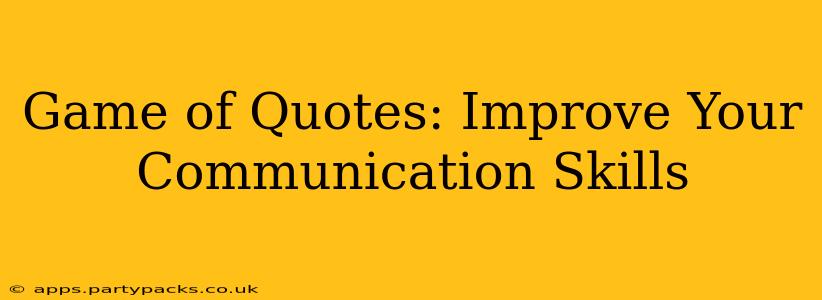Communication is the cornerstone of success in every aspect of life, from personal relationships to professional endeavors. Mastering the art of communication isn't just about speaking; it's about conveying your message effectively and understanding others clearly. This article explores how strategically using quotes—a "Game of Quotes," if you will—can significantly enhance your communication skills. We'll delve into how to select impactful quotes, when to use them, and how to leverage their power to connect with your audience and leave a lasting impression.
Why Use Quotes in Communication?
Quotes add depth, credibility, and memorability to your communication. A well-chosen quote can:
- Illustrate a point: Instead of explaining a complex idea, a relevant quote can succinctly convey the same message.
- Add weight to your argument: A quote from a respected authority figure can lend credibility to your claims.
- Evoke emotion: A poignant or inspiring quote can connect with your audience on an emotional level, making your message more impactful.
- Make your communication more engaging: Quotes break up large blocks of text and keep your audience interested.
- Spark conversation: A thought-provoking quote can stimulate discussion and encourage interaction.
How to Choose the Right Quote
Selecting the right quote is crucial. Consider these factors:
- Relevance: The quote must directly relate to the topic at hand. A random quote, however insightful, will appear out of place.
- Audience: Consider your audience's background, interests, and understanding when choosing a quote. What resonates with one group might not resonate with another.
- Context: The quote should fit seamlessly into the overall flow of your communication. Avoid jarring transitions or abrupt shifts in tone.
- Attribution: Always attribute the quote to its original source. This builds credibility and avoids plagiarism.
When to Use Quotes Effectively
Quotes are powerful tools, but they shouldn't be overused. Consider these scenarios:
- Presentations: A well-placed quote can capture your audience's attention and emphasize a key point.
- Written communication (emails, reports, articles): Quotes can add depth and sophistication to your writing, making it more persuasive and engaging.
- Social media: Short, impactful quotes can be highly shareable and increase engagement.
- One-on-one conversations: A relevant quote can help illustrate your point in a conversation and make it more memorable.
What are Some Common Mistakes to Avoid When Using Quotes?
- Overusing Quotes: Too many quotes can make your communication seem disjointed and lacking in your own voice.
- Using Irrelevant Quotes: A quote that doesn't relate to your topic will only confuse or distract your audience.
- Misinterpreting Quotes: Ensure you understand the quote's meaning and context before using it. Misinterpretations can damage your credibility.
- Failing to Attribute Quotes: This is plagiarism and can have serious consequences.
What Types of Quotes are Most Effective?
The most effective quotes are concise, memorable, and insightful. They often encapsulate a complex idea in a few powerful words. Look for quotes that are:
- Provocative: Quotes that challenge assumptions or spark debate.
- Inspirational: Quotes that motivate or uplift your audience.
- Humorous: Quotes that add a touch of levity and make your communication more engaging.
- Relatable: Quotes that connect with the audience on a personal level.
How Can I Find Relevant Quotes?
There are numerous resources to find relevant quotes. Here are a few:
- Quote websites: Websites dedicated to collecting and organizing quotes from various sources.
- Books: Many books contain memorable quotes that can be used in your communication.
- Articles and journals: Academic and professional publications often contain insightful quotes.
By strategically incorporating quotes into your communication, you can significantly improve its effectiveness. Remember to choose relevant quotes, use them judiciously, and always attribute the source. Master the "Game of Quotes" and watch your communication skills soar!

